| Listing 1 - 10 of 60 | << page >> |
Sort by
|
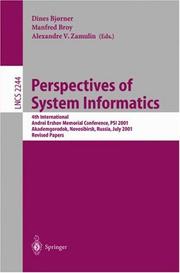
ISSN: 03029743 ISBN: 354043075X 9783540430759 3540455752 Year: 2001 Volume: 2244 Publisher: Berlin, Heidelberg : Springer Berlin Heidelberg : Imprint: Springer,
Abstract | Keywords | Export | Availability | Bookmark
 Loading...
Loading...Choose an application
- Reference Manager
- EndNote
- RefWorks (Direct export to RefWorks)
This book constitutes the thoroughly refereed post-proceedings of the 4th International Andrei Ershov Memorial Conference, PSI 2001, held in Akademgorodok, Novosibirsk, Russia, in July 2001. The 50 revised papers presented together with 2 invited memorial papers devoted to the work of Andrei Ershov were carefully selected during 2 rounds of reviewing and improvement. The book offers topical sections on computing and algorithms, logical methods, verification, program transformation and synthesis, semantics and types, processes and concurrency, UML specification, Petri nets, testing, software construction, data and knowledge bases, logic programming, constraint programming, program analysis, and language implementation.
Computer science --- Computer programming --- Systems engineering --- Computer Science --- Engineering & Applied Sciences --- 681.3*D1 --- 681.3*D2 --- 681.3*D3 --- 681.3*F1 --- 681.3*F3 --- Programming techniques--See also {681.3*E} --- Software engineering: protection mechanisms; standards--See also {681.3*K63}; {681.3*K51} --- Programming languages --- Computation by abstract devices --- Logics and meanings of programs (Theory of computation) --- Congresses --- 681.3*F3 Logics and meanings of programs (Theory of computation) --- 681.3*F1 Computation by abstract devices --- 681.3*D3 Programming languages --- 681.3*D2 Software engineering: protection mechanisms; standards--See also {681.3*K63}; {681.3*K51} --- 681.3*D1 Programming techniques--See also {681.3*E} --- Computer science. --- Architecture, Computer. --- Computer programming. --- Software engineering. --- Programming languages (Electronic computers). --- Computers. --- Computer logic. --- Computer Science. --- Computer System Implementation. --- Programming Languages, Compilers, Interpreters. --- Logics and Meanings of Programs. --- Programming Techniques. --- Software Engineering. --- Computation by Abstract Devices. --- Computer science logic --- Logic, Symbolic and mathematical --- Automatic computers --- Automatic data processors --- Computer hardware --- Computing machines (Computers) --- Electronic brains --- Electronic calculating-machines --- Electronic computers --- Hardware, Computer --- Computer systems --- Cybernetics --- Machine theory --- Calculators --- Cyberspace --- Computer languages --- Computer program languages --- Computer programming languages --- Machine language --- Electronic data processing --- Languages, Artificial --- Computer software engineering --- Engineering --- Computers --- Electronic computer programming --- Electronic digital computers --- Programming (Electronic computers) --- Coding theory --- Architecture, Computer --- Informatics --- Science --- Programming --- Computer network architectures. --- Logic design. --- Design, Logic --- Design of logic systems --- Digital electronics --- Electronic circuit design --- Logic circuits --- Switching theory --- Architectures, Computer network --- Network architectures, Computer --- Computer architecture --- Computer science - Congresses --- Computer programming - Congresses --- Systems engineering - Congresses
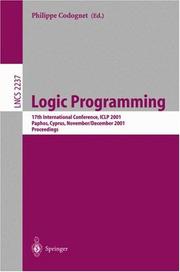
ISSN: 16113349 ISBN: 3540429352 9783540429357 354045635X Year: 2001 Volume: 2237 Publisher: Berlin, Heidelberg : Springer Berlin Heidelberg : Imprint: Springer,
Abstract | Keywords | Export | Availability | Bookmark
 Loading...
Loading...Choose an application
- Reference Manager
- EndNote
- RefWorks (Direct export to RefWorks)
Logic programming --- Programmation logique --- Congresses. --- Congrès --- Computer Science --- Engineering & Applied Sciences --- 681.3*D16 --- 681.3*D3 --- 681.3*F3 --- 681.3*F41 --- 681.3*I23 --- Computerwetenschap--?*D16 --- Programming languages --- Logics and meanings of programs (Theory of computation) --- Mathematical logic: computability theory; computational logic; lambda calculus; logic programming; mechanical theorem proving; model theory; proof theory;recursive function theory--See also {681.3*F11}; {681.3*I22}; {681.3*I23} --- Deduction and theorem proving: answer/reason extraction; reasoning; resolution; metatheory; mathematical induction; logic programming (Artificial intelligence) --- 681.3*I23 Deduction and theorem proving: answer/reason extraction; reasoning; resolution; metatheory; mathematical induction; logic programming (Artificial intelligence) --- 681.3*F41 Mathematical logic: computability theory; computational logic; lambda calculus; logic programming; mechanical theorem proving; model theory; proof theory;recursive function theory--See also {681.3*F11}; {681.3*I22}; {681.3*I23} --- 681.3*F3 Logics and meanings of programs (Theory of computation) --- 681.3*D3 Programming languages --- Logic programming. --- Congrès --- Computer science. --- Architecture, Computer. --- Software engineering. --- Computer programming. --- Programming languages (Electronic computers). --- Computer logic. --- Artificial intelligence. --- Computer Science. --- Computer System Implementation. --- Software Engineering/Programming and Operating Systems. --- Programming Techniques. --- Artificial Intelligence (incl. Robotics). --- Programming Languages, Compilers, Interpreters. --- Logics and Meanings of Programs. --- AI (Artificial intelligence) --- Artificial thinking --- Electronic brains --- Intellectronics --- Intelligence, Artificial --- Intelligent machines --- Machine intelligence --- Thinking, Artificial --- Bionics --- Cognitive science --- Digital computer simulation --- Electronic data processing --- Logic machines --- Machine theory --- Self-organizing systems --- Simulation methods --- Fifth generation computers --- Neural computers --- Computer science logic --- Logic, Symbolic and mathematical --- Computer languages --- Computer program languages --- Computer programming languages --- Machine language --- Languages, Artificial --- Computers --- Electronic computer programming --- Electronic digital computers --- Programming (Electronic computers) --- Coding theory --- Computer software engineering --- Engineering --- Architecture, Computer --- Informatics --- Science --- Programming --- Computer programming --- Computer network architectures. --- Logic design. --- Artificial Intelligence. --- Design, Logic --- Design of logic systems --- Digital electronics --- Electronic circuit design --- Logic circuits --- Switching theory --- Architectures, Computer network --- Network architectures, Computer --- Computer architecture
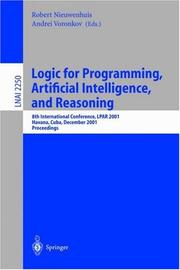
ISBN: 3540456538 3540429573 9783540429579 Year: 2001 Volume: 2250 Publisher: New York, NY ; Berlin : Springer-Verlag,
Abstract | Keywords | Export | Availability | Bookmark
 Loading...
Loading...Choose an application
- Reference Manager
- EndNote
- RefWorks (Direct export to RefWorks)
This volume contains the papers presented at the Eighth International C- ference on Logic for Programming, Arti?cial Intelligence and Reasoning (LPAR 2001), held on December 3-7, 2001, at the University of Havana (Cuba), together with the Second International Workshop on Implementation of Logics. There were 112 submissions, of which 19 belonged to the special subm- sion category of experimental papers, intended to describe implementations or comparisons of systems, or experiments with systems. Each submission was - viewed by at least three program committee members and an electronic program committee meeting was held via the Internet. The high number of submissions caused a large amount of work, and we are very grateful to the other 31 PC members for their e?ciency and for the quality of their reviews and discussions. Finally, the committee decided to accept 40papers in the theoretical ca- gory, and 9 experimental papers. In addition to the refereed papers, this volume contains an extended abstract of the invited talk by Frank Wolter. Two other invited lectures were given by Matthias Baaz and Manuel Hermenegildo. Apart from the program committee, we would also like to thank the other people who made LPAR 2001 possible: the additional referees; the Local Arran- ` gements Chair Luciano Garc´?a; Andr´es Navarro and Oscar Guell, ¨ who ran the internet-based submission software and the program committee discussion so- ware at the LSI Department lab in Barcelona; and Bill McCune, whose program committee management software was used.
Logic programming --- Artificial intelligence --- Automatic theorem proving --- Computer Science --- Mechanical Engineering - General --- Engineering & Applied Sciences --- Mechanical Engineering --- Program verification: assertion checkers; correctness proofs; reliability; validation (Software engineering)--See also {681.3*F31} --- Mathematical logic: computability theory; computational logic; lambda calculus; logic programming; mechanical theorem proving; model theory; proof theory;recursive function theory--See also {681.3*F11}; {681.3*I22}; {681.3*I23} --- Deduction and theorem proving: answer/reason extraction; reasoning; resolution; metatheory; mathematical induction; logic programming (Artificial intelligence) --- 681.3*I23 Deduction and theorem proving: answer/reason extraction; reasoning; resolution; metatheory; mathematical induction; logic programming (Artificial intelligence) --- 681.3*F41 Mathematical logic: computability theory; computational logic; lambda calculus; logic programming; mechanical theorem proving; model theory; proof theory;recursive function theory--See also {681.3*F11}; {681.3*I22}; {681.3*I23} --- 681.3*D24 Program verification: assertion checkers; correctness proofs; reliability; validation (Software engineering)--See also {681.3*F31} --- Computer science. --- Software engineering. --- Computer logic. --- Mathematical logic. --- Artificial intelligence. --- Computer Science. --- Artificial Intelligence (incl. Robotics). --- Software Engineering/Programming and Operating Systems. --- Logics and Meanings of Programs. --- Software Engineering. --- Mathematical Logic and Formal Languages. --- AI (Artificial intelligence) --- Artificial thinking --- Electronic brains --- Intellectronics --- Intelligence, Artificial --- Intelligent machines --- Machine intelligence --- Thinking, Artificial --- Bionics --- Cognitive science --- Digital computer simulation --- Electronic data processing --- Logic machines --- Machine theory --- Self-organizing systems --- Simulation methods --- Fifth generation computers --- Neural computers --- Algebra of logic --- Logic, Universal --- Mathematical logic --- Symbolic and mathematical logic --- Symbolic logic --- Mathematics --- Algebra, Abstract --- Metamathematics --- Set theory --- Syllogism --- Computer science logic --- Logic, Symbolic and mathematical --- Computer software engineering --- Engineering --- Informatics --- Science --- 681.3*D24 --- 681.3*F3 --- 681.3*F41 --- 681.3*I23 --- 681.3*F3 Logics and meanings of programs (Theory of computation) --- Logics and meanings of programs (Theory of computation) --- Logic design. --- Artificial Intelligence. --- Design, Logic --- Design of logic systems --- Digital electronics --- Electronic circuit design --- Logic circuits --- Switching theory --- Logic programming - Congresses --- Artificial intelligence - Congresses --- Automatic theorem proving - Congresses
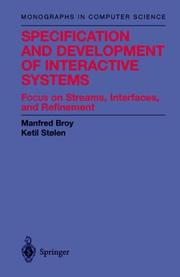
ISBN: 0387950737 1461265185 1461300916 Year: 2001 Publisher: New York. N.Y. Springer
Abstract | Keywords | Export | Availability | Bookmark
 Loading...
Loading...Choose an application
- Reference Manager
- EndNote
- RefWorks (Direct export to RefWorks)
This book presents a fundamental mathematical and logical approach to soft ware and systems engineering. Considering the large number of books de scribing mathematical approaches to program development, it is important to explain what we consider to be the specific contribution of our book, to identify our goals, and to characterize our intended target audience. Most books dealing with the mathematics and logics of programming and system development are mainly devoted to programming in the small. This is in contrast to our book where the emphasis is on modular system development with the help of component specifications with precisely identified interfaces and refinement concepts. Our book aims at systems development carried out in a systematic way, based on a clear mathematical theory. We do not claim that this book presents a full-blown engineering method. In fact, this is certainly not a book for the application-driven software engi neer looking for a practical method for system development in an industrial context. It is much rather a book for the computer scientist and the scientifi cally interested engineer who looks for basic principles of system development and, moreover, its mathematical foundations. It is also a book for method builders interested in a proper mathematical foundation on which they can build a practical development method and industrial-strength support tools.
Computer science --- Software engineering. --- Systems engineering. --- Computers. --- Computer logic. --- Mathematical logic. --- Theory of Computation. --- Software Engineering/Programming and Operating Systems. --- Logics and Meanings of Programs. --- Mathematical Logic and Formal Languages. --- Algebra of logic --- Logic, Universal --- Mathematical logic --- Symbolic and mathematical logic --- Symbolic logic --- Mathematics --- Algebra, Abstract --- Metamathematics --- Set theory --- Syllogism --- Computer science logic --- Logic, Symbolic and mathematical --- Computer software engineering --- Engineering --- Automatic computers --- Automatic data processors --- Computer hardware --- Computing machines (Computers) --- Electronic brains --- Electronic calculating-machines --- Electronic computers --- Hardware, Computer --- Computer systems --- Cybernetics --- Machine theory --- Calculators --- Cyberspace
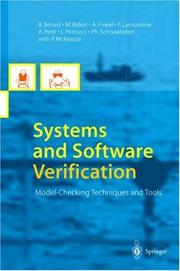

ISBN: 3540415238 9783540415237 Year: 2001 Publisher: Berlin Springer
Abstract | Keywords | Export | Availability | Bookmark
 Loading...
Loading...Choose an application
- Reference Manager
- EndNote
- RefWorks (Direct export to RefWorks)
Programming --- Computer systems --- Computer software --- Systèmes informatiques --- Logiciels --- Verification --- Vérification --- 681.3*D24 --- 681.3*D2 --- 681.3*D45 --- 681.3*F32 --- 681.3*F31 --- 681.3*F41 --- 681.3*G4 --- 681.3*I22 --- Software verification --- Verification of software --- Verification of computer systems --- Program verification: assertion checkers; correctness proofs; reliability; validation (Software engineering)--See also {681.3*F31} --- Software engineering: protection mechanisms; standards--See also {681.3*K63}; {681.3*K51} --- Reliability: backup procedures; checkpoint/restart; fault-tolerance; verification (Operating systems) --- Semantics of programming languages: algebraic approaches to semantics; denotational semantics; operational semantics (Logics and meanings of programs)--See also {681.3*D31} --- Specifying anf verifying and reasoning about programs: assertions; invariants; mechanical verification; pre- and post-conditions (Logics and meanings of programs)--See also {681.3*D21}; {681.3*D24}; {681.3*D31}; {681.3*E1} --- Mathematical logic: computability theory; computational logic; lambda calculus; logic programming; mechanical theorem proving; model theory; proof theory;recursive function theory--See also {681.3*F11}; {681.3*I22}; {681.3*I23} --- Mathematical software: algorithm analysis; certification and testing; efficiency; portability; reliability and robustness; verification --- Automatic programming: automatic analysis of algorithms; program modification; program synthesis; program transformation; program verification (Artificialintelligence)--See also {681.3*D12}; {681.3*F31} --- Verification. --- 681.3*I22 Automatic programming: automatic analysis of algorithms; program modification; program synthesis; program transformation; program verification (Artificialintelligence)--See also {681.3*D12}; {681.3*F31} --- 681.3*G4 Mathematical software: algorithm analysis; certification and testing; efficiency; portability; reliability and robustness; verification --- 681.3*F41 Mathematical logic: computability theory; computational logic; lambda calculus; logic programming; mechanical theorem proving; model theory; proof theory;recursive function theory--See also {681.3*F11}; {681.3*I22}; {681.3*I23} --- 681.3*F31 Specifying anf verifying and reasoning about programs: assertions; invariants; mechanical verification; pre- and post-conditions (Logics and meanings of programs)--See also {681.3*D21}; {681.3*D24}; {681.3*D31}; {681.3*E1} --- 681.3*F32 Semantics of programming languages: algebraic approaches to semantics; denotational semantics; operational semantics (Logics and meanings of programs)--See also {681.3*D31} --- 681.3*D45 Reliability: backup procedures; checkpoint/restart; fault-tolerance; verification (Operating systems) --- 681.3*D2 Software engineering: protection mechanisms; standards--See also {681.3*K63}; {681.3*K51} --- 681.3*D24 Program verification: assertion checkers; correctness proofs; reliability; validation (Software engineering)--See also {681.3*F31} --- Systèmes informatiques --- Vérification
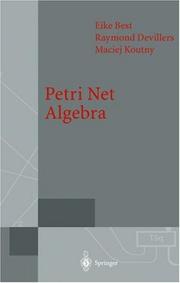
ISBN: 3540673989 9783540673989 3642086772 3662044579 Year: 2001 Publisher: Berlin New York : Springer,
Abstract | Keywords | Export | Availability | Bookmark
 Loading...
Loading...Choose an application
- Reference Manager
- EndNote
- RefWorks (Direct export to RefWorks)
This book presents a step-by-step development of a rigorous framework for the specification and verification of concurrent systems. Petri Net Algebra takes its inspiration and methods from Process Algebra and Petri Nets, two prominent branches of concurrency theory. Added synergistic benefit is derived from combining their respective advantages. Petri nets are treated as composable objects, and as such they are embedded in a general process algebra. On the other hand, a generic process algebra is given an automatic Petri net semantics so that net-based verification techniques, based on structural invariants and causal partial orders, can be applied to the process algebra. Finally, the theory is applied to a realistic concurrent programming language. The book contains full proofs, carefully chosen examples and several possible directions for further research. It is self-contained and supposes only acquaintance with basic discrete mathematics. A unique aspect is that the development of the Petri net algebra is handled so as to allow for further application-oriented extensions and modifications.
Parallel processing (Electronic computers) --- Computer science --- Petri nets --- Parallélisme (Informatique) --- Informatique --- Réseaux de Pétri --- Mathematics --- Mathématiques --- Parallélisme (Informatique) --- Réseaux de Pétri --- Mathématiques --- Mathematics. --- Petri, Réseaux de --- Algebra. --- Computer logic. --- Computers. --- Software engineering. --- Computer science—Mathematics. --- Logics and Meanings of Programs. --- Computation by Abstract Devices. --- Software Engineering. --- Symbolic and Algebraic Manipulation. --- Discrete Mathematics in Computer Science. --- Computer software engineering --- Engineering --- Automatic computers --- Automatic data processors --- Computer hardware --- Computing machines (Computers) --- Electronic brains --- Electronic calculating-machines --- Electronic computers --- Hardware, Computer --- Computer systems --- Cybernetics --- Machine theory --- Calculators --- Cyberspace --- Computer science logic --- Logic, Symbolic and mathematical --- Mathematical analysis --- Computer science - Mathematics
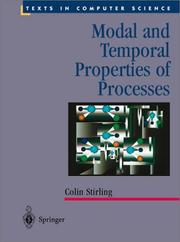
ISBN: 0387987177 1441931538 1475735502 9780387987170 Year: 2001 Publisher: New York, NY ; Berlin : Springer-Verlag,
Abstract | Keywords | Export | Availability | Bookmark
 Loading...
Loading...Choose an application
- Reference Manager
- EndNote
- RefWorks (Direct export to RefWorks)
Computer logic --- Parallel processing (Electronic computers) --- Logique informatique --- Parallélisme (Informatique) --- Parallélisme (Informatique) --- Control engineering. --- Software engineering. --- Computer engineering. --- Computer logic. --- Mathematical logic. --- Control and Systems Theory. --- Software Engineering/Programming and Operating Systems. --- Computer Engineering. --- Logics and Meanings of Programs. --- Mathematical Logic and Formal Languages. --- Algebra of logic --- Logic, Universal --- Mathematical logic --- Symbolic and mathematical logic --- Symbolic logic --- Mathematics --- Algebra, Abstract --- Metamathematics --- Set theory --- Syllogism --- Computer science logic --- Logic, Symbolic and mathematical --- Computers --- Computer software engineering --- Engineering --- Control engineering --- Control equipment --- Control theory --- Engineering instruments --- Automation --- Programmable controllers --- Design and construction
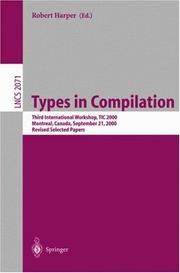
ISBN: 3540453326 3540421963 Year: 2001 Publisher: New York, NY ; Berlin : Springer-Verlag,
Abstract | Keywords | Export | Availability | Bookmark
 Loading...
Loading...Choose an application
- Reference Manager
- EndNote
- RefWorks (Direct export to RefWorks)
The importance of typed languages for building robust software systems is, by now, an undisputed fact. Years of research have led to languages with richly expressive, yet easy to use, type systems for high-level programming languages. Types provide not only a conceptual framework for language designers, but also a ord positive bene ts to the programmer, principally the ability to express and enforce levels of abstraction within a program. Early compilers for typed languages followed closely the methods used for their untyped counterparts. The role of types was limited to the earliest s- ges of compilation, and they were thereafter ignored during the remainder of the translation process. More recently, however, implementors have come to - cognize the importance of types during compilation and even for object code. Several advantages of types in compilation have been noted to date: { They support self-checking by the compiler. By tracking types during c- pilation it is possible for an internal type checker to detect translation errors at an early stage, greatly facilitating compiler development. { They support certi cation of object code. By extending types to the ge- rated object code, it becomes possible for a code user to ensure the basic integrity of that code by checking its type consistency before execution. { They support optimized data representations and calling conventions, even in the presence of modularity. By passing types at compile-, link-, and even run-time, it is possible to avoid compromises of data representation imposed by untyped compilation techniques.
Compiling (Electronic computers) --- Computer Science --- Engineering & Applied Sciences --- Computer science. --- Programming languages (Electronic computers). --- Computer logic. --- Mathematical logic. --- Computer Science. --- Programming Languages, Compilers, Interpreters. --- Logics and Meanings of Programs. --- Mathematical Logic and Formal Languages. --- Automatic programming (Computer science) --- Electronic data processing --- Assembling (Electronic computers) --- Macro processors --- Logic design. --- Design, Logic --- Design of logic systems --- Digital electronics --- Electronic circuit design --- Logic circuits --- Machine theory --- Switching theory --- Informatics --- Science --- Algebra of logic --- Logic, Universal --- Mathematical logic --- Symbolic and mathematical logic --- Symbolic logic --- Mathematics --- Algebra, Abstract --- Metamathematics --- Set theory --- Syllogism --- Computer science logic --- Logic, Symbolic and mathematical --- Computer languages --- Computer program languages --- Computer programming languages --- Machine language --- Languages, Artificial
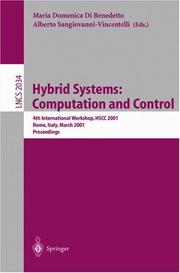
ISSN: 03029743 ISBN: 3540418660 9783540418665 3540453512 Year: 2001 Volume: 2034 Publisher: Berlin, Heidelberg : Springer Berlin Heidelberg : Imprint: Springer,
Abstract | Keywords | Export | Availability | Bookmark
 Loading...
Loading...Choose an application
- Reference Manager
- EndNote
- RefWorks (Direct export to RefWorks)
This volume contains the proceedings of the Fourth Workshop on Hybrid - stems: Computation and Control (HSCC 2001) held in Rome, Italy on March 28-30, 2001. The Workshop on Hybrid Systems attracts researchers from in- stry and academia interested in modeling, analysis, synthesis, and implemen- tion of dynamic and reactive systems involving both discrete (integer, logical, symbolic) and continuous behaviors. It is a forum for the discussion of the - test developments in all aspects of hybrid systems, including formal models and computational representations, algorithms and heuristics, computational tools, and new challenging applications. The Fourth HSCC International Workshop continues the series of workshops held in Grenoble, France (HART’97), Berkeley, California, USA (HSCC’98), N- megen, The Netherlands (HSCC’99), and Pittsburgh, Pennsylvania, USA (HSCC 2000). Proceedings of these workshops have been published in the Lecture Notes in Computer Science (LNCS) series by Springer-Verlag. In line with the beautiful work that led to the design of the palace in which the workshop was held, Palazzo Lancellotti in Rome, resulting from the col- boration of many artists and architects of di erent backgrounds, the challenge faced by the hybrid system community is to harmonize and extract the best from two main research areas: computer science and control theory.
Hybrid computers --- Calculateurs hybrides --- Congresses --- Congrès --- Computer science. --- Computer hardware. --- Special purpose computers. --- Software engineering. --- Computers. --- Computer logic. --- Computer Science. --- Software Engineering/Programming and Operating Systems. --- Theory of Computation. --- Computer Hardware. --- Logics and Meanings of Programs. --- Software Engineering. --- Special Purpose and Application-Based Systems. --- Computer science logic --- Logic, Symbolic and mathematical --- Automatic computers --- Automatic data processors --- Computer hardware --- Computing machines (Computers) --- Electronic brains --- Electronic calculating-machines --- Electronic computers --- Hardware, Computer --- Computer systems --- Cybernetics --- Machine theory --- Calculators --- Cyberspace --- Computer software engineering --- Engineering --- Special purpose computers --- Computers --- Informatics --- Science --- Information theory. --- Logic design. --- Design, Logic --- Design of logic systems --- Digital electronics --- Electronic circuit design --- Logic circuits --- Switching theory --- Communication theory --- Communication --- Hybrid computers - Congresses
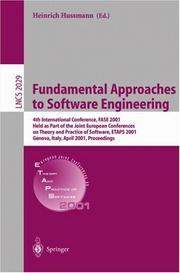
ISSN: 03029743 ISBN: 3540418636 9783540418634 3540453148 Year: 2001 Volume: 2029 Publisher: New York, NY ; Berlin : Springer-Verlag,
Abstract | Keywords | Export | Availability | Bookmark
 Loading...
Loading...Choose an application
- Reference Manager
- EndNote
- RefWorks (Direct export to RefWorks)
ETAPS 2001 is the fourth instance of the European Joint Conferences on Theory and Practice of Software. ETAPS is an annual federated conference that was established in 1998 by combining a number of existing and new conferences. This year it comprises ve conferences (FOSSACS, FASE, ESOP, CC, TACAS), ten satellite workshops (CMCS, ETI Day, JOSES, LDTA, MMAABS, PFM, RelMiS, UNIGRA, WADT, WTUML), seven invited lectures, a debate, and ten tutorials. The events that comprise ETAPS address various aspects of the system - velopment process, including speci cation, design, implementation, analysis and improvement. The languages, methodologies and tools which support these - tivities are all well within its scope. Di erent blends of theory and practice are represented, with an inclination towards theory with a practical motivation on one hand and soundly-based practice on the other. Many of the issues involved in software design apply to systems in general, including hardware systems, and the emphasis on software is not intended to be exclusive.
Software engineering --- Génie logiciel --- Congresses. --- Congrès --- Computer science. --- Software engineering. --- Programming languages (Electronic computers). --- Computer logic. --- Computer Science. --- Software Engineering/Programming and Operating Systems. --- Software Engineering. --- Programming Languages, Compilers, Interpreters. --- Logics and Meanings of Programs. --- Logic design. --- Design, Logic --- Design of logic systems --- Digital electronics --- Electronic circuit design --- Logic circuits --- Machine theory --- Switching theory --- Informatics --- Science --- Computer software engineering --- Engineering --- Computer science logic --- Logic, Symbolic and mathematical --- Computer languages --- Computer program languages --- Computer programming languages --- Machine language --- Electronic data processing --- Languages, Artificial --- Software engineering - Congresses
| Listing 1 - 10 of 60 | << page >> |
Sort by
|

 Search
Search Feedback
Feedback About
About Help
Help News
News